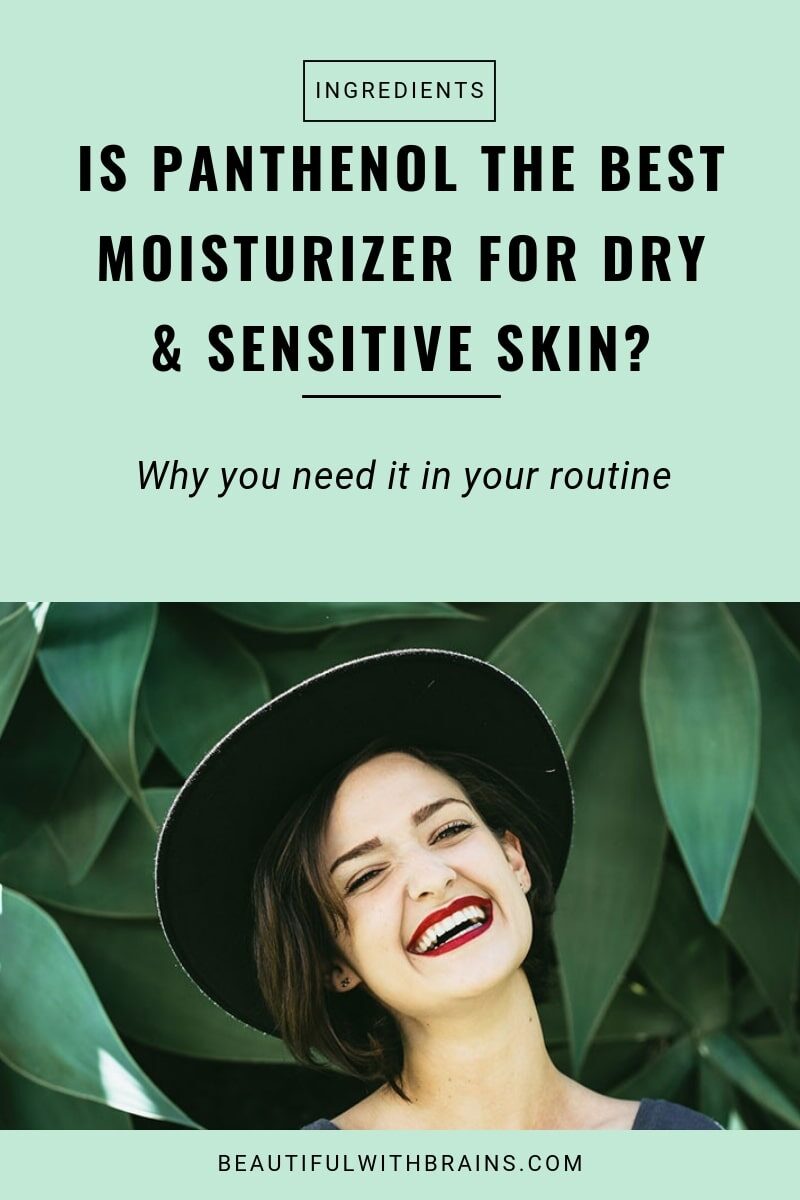
Did you know Pantene takes its name from Panthenol, its hero ingredient?
But this pro-vitamin ain’t just for hair. It’s just as good for skin, nails and the rest of your body, too. Here are its superpowers:
What Is Panthenol?
Panthenol is the alcohol form of Vitamin B5, a.k.a panthotenic acid.
Don’t be scared by the word alcohol – Panthenol is one of the good kinds of alcohol. Far from drying out your skin, it helps to moisturise it. For real.
Panthenol is also called pro-vitamin B5 because it converts into Vitamin B5 in the skin. It’s more used than Vitamin B5 itself because it penetrates skin better. Who would have thought it?
Fun fact: Panthenol is naturally present in all living cells.
Related: What Does Alcohol-Free Really Mean (Hint: It’s Not What You Think)
How Does Panthenol Help Skin?
Panthenol is a multitasker that helps skin in two main ways:
1. Panthenol Is An Excellent Moisturizer
Panthenol is an excellent moisturizer. The scientific term is humectant: it draws moisture from the air and the deeper layers of your skin up to the most superficial layers.
It’s not as drying as you think. Your skin is made mostly of water, so you’re just redistributing it and making sure each layer gets all the moisture it needs.
Moisture is the foundation of healthy skin: it plumps up skin so that fine lines and wrinkles look smaller; it softens up your skin’s texture; and it gives the complexion a dewy glow.
P.S. If you have dry skin or a broken protective barrier, make sure you slather on an occlusive moisturiser after Panthenol. If you don’t, the extra moisture will evaporate out into thin air. Bummer!
Related: What The Heck Are Humectants And Why Do You Need Them In Your Skincare Routine?
2. Panthenol Heals & Soothes Skin
Panthenol helps heal all kinds of skin damage:
- Wound healing: It stimulates the growth of dermal fibroblasts to help wounds heal faster.
- Barrier repair: It helps regenerates the outer skin layers to repair and strengthen your skin’s protective barrier.
- Soothing: It helps reduce irritation, inflammation, redness and itchiness.
If you’ve got dry or sensitive skin, adding Panthenol to your skincare routine can help soothe the itchy symptoms and nurse your skin back to health.
Related: How To Heal & Strengthen Your Skin’s Protective Barrier (And Why It Matters)
What Else Does Panthenol Do For Skin And Hair?
Panthenol has a few more superpowers:
- Nails: It creates a film on the nail that increases its moisture levels. In other words, it moisturises nails, too.
- Hair: It coats hair, creating a film that keeps it soft and hydrated. Plus, it reduces breakage.
- Penetration-enhancer: It helps active ingredients better penetrate skin.
Panthenol is a head-to-toe moisturizer with extra benefits. Hard to believe it’s not more popular, is it?
Does Panthenol Have Any Side Effects?
Good news: Panthenol is super gentle on the skin. So gentle, anyone can use it.
It’s true it can cause allergies and irritations (but then, what doesn’t?), but these are very rare. Unless you’re allergic to it, there’s no reason to avoid Panthenol in your skincare products.
What Are The Best Products With Panthenol?
- First Aid Beauty Ultra Repair Hydrating Serum ($38.00): available at Asos, Feel Unique, Sephora and Ulta
- La Roche Posay Cicaplast Baume B5 (£7.50): available at Dermstore, Escentual, Feel Unique and Look Fantastic
- Paula’s Choice Hyaluronic Acid Booster ($36.00): available at Cult Beauty, Dermstore, Nordstrom and Paula’s Choice
- The Ordinary Amino Acids + B5 (£5.90): available at Asos, Beauty Bay, Cult Beauty, Escentual, Feel Unique and Sephora
The Bottom Line
Panthenol is a multitasking pro-vitamin that moisturises your body from head to toe. It makes skin softer, soothes irritations and even helps wounds heal faster. If you’ve got dry, sensitive skin, it’s a must.
Are you using Panthenol in your skincare routine? Share your thoughts in the comments below.

